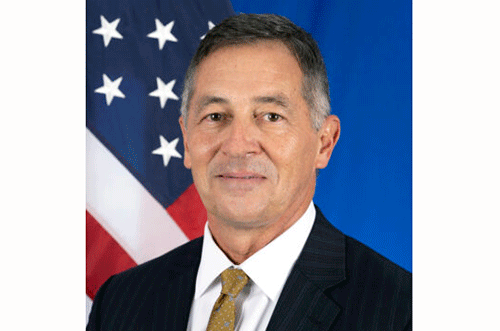Ambassador Randy Berry
“The United States is all in on Africa,” President Biden affirmed during the US-Africa Leaders Summit last December.
The future is Africa. One example is its youthful population: The median age on the continent is 19. By 2050, one in four people in the world will be in Africa. The United States wants them to be healthy and wealthy. What happens in Africa will affect the rest of the globe – and we want to work together to ensure it is bright, safe, and prosperous.
Our stories have always been intertwined. Today, we know that our success—the success of all our people, on both sides of the Atlantic—is inextricably linked. Our African partners are central to the United States’ approach to driving trade that is accessible, fair, competitive, and resilient. We need to partner together to protect the dignity of all workers and sustainability of our planet — and pursue a race to the top amongst institutions and enterprises. “Prosper Africa” is the U.S. government initiative to increase two-way trade and investment between the United States and African countries. Through Prosper Africa, the U.S. government works with the private sector and our African government partners to advance deals, promote market opportunities, and strengthen business and investment climates. In so doing, Prosper Africa creates jobs for both African and American workers and fosters shared prosperity.
The African Growth and Opportunity Act, or AGOA, is a key pillar to realising this vision for shared prosperity. Since it was signed over two decades ago, AGOA has made a tremendous difference for millions of Africans. By providing duty-free access to the U.S. market for over 6 800 different products, the legislation has helped create jobs and new economic opportunities, including for women and youth. If you manage a business here in Namibia, I encourage you to see how you might use AGOA to increase your sales, train more employees, and better your community.
AGOA is an example of how we can use trade as a force for good. To maintain eligibility, countries must uphold several values that are core to free and fair societies—rule of law, respect for human rights combatting corruption, and protecting workers’ rights.
In a nutshell, AGOA is intended to be a transformational tool to bolster inclusive prosperity across Sub-Saharan Africa, including Namibia.
In Namibia, the U.S. government supported the Ministry of Industrialisation and Trade to develop the National African Growth and Opportunity Act (AGOA) Utilisation Strategy in May 2021 through a consultative process with key sectors. Since 2017, we have directly supported Namibian firms to unlock more than N$30 million worth of exports to the United States under AGOA. Namibia also saw a recent increase in exports to the United States over the last three years primarily due to charcoal exports to the United States by The Good Charcoal Company which uses sustainably harvested Namibian wood. Agricultural products, chemicals, minerals, metals, and other manufacturers were the top export categories. I want us to find more opportunities for local companies to train Namibians and export high-quality, valuable goods to the United States.
This is why the Biden-Harris Administration fully supports reauthorising AGOA, as the benefits of the legislation are set to expire in 2025. The U.S. Congress holds the pen on reauthorisation, and we are committed to working closely with Congress throughout the process to ensure this legislation is impactful and relevant.
Policy tools like AGOA are meant to be used, tested, and sharpened over time — which is the driving purpose of the AGOA Forum being held this week in Johannesburg, South Africa.
Every year, the U.S. trade representative and trade ministers from every country that participates in AGOA come together to take stock of their work together and find opportunities to do more. This convening is an opportunity to gauge progress to date and perhaps more importantly, discuss if we can improve AGOA to better serve more Africans and Americans.
Moreover, the forum is a catalyst to convene a broader community. Government officials, civil society and labour leaders, and private sector investors all come together from across the continent and the United States with a shared goal of using trade to create better opportunities.
This is a valuable moment in Namibia’s economic engagement with the United States, and I look forward to a robust, forward-looking conversation — at the AGOA Forum and beyond.
* Randy Berry is the Ambassador of the United States of America in Namibia.



